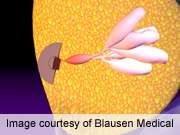For women with operable breast cancer, moderate immunohistochemical expression of human epidermal growth factor receptor (HER)-2 (2+) without amplification of HER-2 is an adverse prognostic factor, according to a study published online Sept. 4 in The Oncologist.
(HealthDay)—For women with operable breast cancer, moderate immunohistochemical expression of human epidermal growth factor receptor (HER)-2 (2+) without amplification of HER-2 (HER-2 2+/HER-2−) is an adverse prognostic factor, according to a study published online Sept. 4 in The Oncologist.
Valentina Rossi, M.D., from the Institute for Cancer Research and Treatment in Candiolo, Italy, and colleagues compared the clinical outcomes of 1,150 women (median age, 58 years) with operable breast cancer who were not receiving adjuvant trastuzumab. Patients were stratified according to a common HER-2 testing algorithm.
Of the women, 40 percent were considered HER-2 0+; 39 percent were HER-2 1+; 10 percent were HER-2 2+/HER-2−; and 11 percent were HER-2+ (3+ or HER-2+) by fluorescence in situ hybridization. The researchers found that, on multivariate analysis, a HER-2 2+/HER-2− status correlated with worse disease-free survival, compared with a HER-2 0 or 1+ status. A HER-2 2+/HER-2− status showed a time-dependent effect on the probability of disease-free survival, with an initial advantage that lessened every year by a factor of 1.649, compared with a HER-2+ status.
"A HER-2 2+/HER-2−status is an adverse prognostic factor in patients with operable breast cancer," the authors write. "Because of suggestions from randomized trials that the benefits of adjuvant trastuzumab may not be limited to patients with HER-2+ tumors, patients with a HER-2 2+/HER-2−status are ideal candidates for studies testing this hypothesis."
One author disclosed financial ties to the pharmaceutical industry.
More information:
Abstract
Full Text (subscription or payment may be required)
Copyright © 2012 HealthDay. All rights reserved.





















